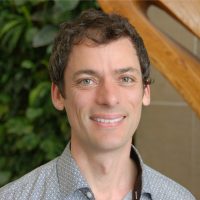
Associate Professor Murray Richardson
Undergraduate Physical Geography and Geomatics Program Supervisor, Student Advisor and Associate Professor
| Degrees: | B.Sc. (Trent University), M.Sc. (University of Toronto), Ph.D. (Toronto) |
| Phone: | 613-520-2600 x 2574 |
| Email: | murray.richardson@carleton.ca |
| Office: | B354 Loeb |
Faculty contact for Physical Geography And Geomatics program advice and guidance.
Murray Richardson’s Student Advising Hours: Tuesdays and Thursdays 1-4pm (or by appointment)
Professional Biography
I conduct interdisciplinary research in Geomatics (GIS and Remote Sensing), Physical Hydrology and the Biogeosciences, focusing primarily on natural and anthropogenic drivers of surface hydrology and water quality throughout Canada’s northern ecozones, central Ontario and the Ottawa-Gatineau region. I also specialize in high spatial resolution topographic and vegetation analysis using airborne LiDAR (Light Detection and Ranging) and RPAS (remotely piloted aircraft systems or “drones”). The application of emerging techniques in machine learning for image classification and statistical clustering of spatial and environmental datasets is a topic of ongoing interest.
I teach courses at all levels in the Department of Geography and Environmental Studies and supervise a team of graduate and undergraduate students, often in collaboration with my faculty colleagues and adjunct research professors. I am also the co-director of the Water and Ice Research Lab (WIRL) at Carleton. I work with government, industry, not-for-profit partners and community groups, and always welcome new research opportunities that fall within my areas of expertise.
Research keywords
hydrology; water-quality; snow; watershed ecosystems; limnology; wetlands; mercury; GIS; remote sensing; remote sensing; geo-computation; digital terrain analysis; spatial statistics; ecohydrology; DEMs; photogrammetry; UAVs
Research Opportunities and Accommodations
Please contact me by email about possible research opportunities at the undergraduate or graduate level. I am always happy to hear from highly motivated students who share my interests in northern physical geography, watershed science and environmental geocomputation.
While my research usually involves northern fieldwork, I am absolutely open to discussing accommodation options to make this aspect of my work more accessible and inclusive. I can also supervise desktop-based research projects involving quantitative methods and geospatial computing.
International students please be advised that funding opportunities to support you as graduate students are highly competitive, and I receive inquiries from many highly qualified individuals every year, from all over the world. It is rare that I can offer a position in my research group due to the extraordinary funding requirements for international graduate students. For more information on costs associated with graduate school for international students, please visit Cost and Fees | Graduate Admissions (carleton.ca).
Current and/or recently funded research projects as Principal Investigator (PI) or co-Investigator (CI)
- Polar Knowledge Canada (2021-2024) – “Partnership for understanding environmental change impacts on water security and water quality in Iqaluit, NU” (CI)
- MITACS Accelerate (2021-2022) – “Measurement and modelling of stream thermal regimes in the Ottawa River watershed” (PI with Ottawa Riverkeeper Organization)
- NSERC Discovery Grant and Northern Research Supplement (2018-2022) – “Water, carbon and mercury cycling in Arctic terrestrial and freshwater ecosystems ” (PI)
- Northern Contaminants Program, Aboriginal Affairs and Northern Development (2017-2018) – “Snowpack mercury mass balance over the spring melt period, Iqaluit, NU” (PI)
- Government of Northwest Territories Cumulative Impacts Monitoring Program (GNWT CIMP, 2018-2020) – “Empirical modelling for improved streamflow forecasting in the Snare River basin, NWT” (CI)
- Polar Knowledge Canada (2015-2018) – “Partnership for integrated environmental monitoring and water science training in the Apex River watershed, Iqaluit, NU” (PI)
- Northern Contaminants Program, Aboriginal Affairs and Northern Development (2014-2016) – “Metal loading and retention in Arctic tundra lakes during spring snowmelt” with co-PI Jamal Shirley, Nunavut Research Institute (PI)
- Canadian Foundation for Innovation Leaders Opportunity Fund – “Water and Ice Laboratory Infrastructure Grant” with co-PI Derek Mueller, Carleton University
- Northern Contaminants Program, Aboriginal Affairs and Northern Development (2013-2015) – “A latitudinal investigation of ecosystem sensitivity to methylmercury bioaccumulation in Arctic freshwaters” (CI)
- NSERC Discovery Grant (2012-2017) – “Water balance modelling in complex terrain: new approaches for Canada’s northern lowland and Precambrian Shield regions” (PI)
Community-based participatory research projects with Water First
- First Nations Environmental Contaminants Program (Health Canada), “A community-based monitoring study to establish baseline fish mercury and heavy metal concentrations in the traditional territory of Temagami First Nation (TFN), Ontario, Canada” (CI)
- Health Canada First Nations Drinking Water Quality Monitoring Program (2013), “Shawanaga First Nation Community-Based Source Water Protection Research Partnership” (CI)
2023-2024 Courses
- GEOG 3010 Winter – Field Methods in Physical Geography
- GEOM 1004 Winter – Maps, Satellites and the Geospatial Revolution
- GEOG 5001 Fall – Modelling Environmental Systems
Past Courses
- GEOG5002 Quantitative Methods for Geographic Research
- GEOG 3000 Honours Field Course
- GEOM 3007 Cartographic Theory & Design
- GEOG 3103 Watershed Hydrology
- GEOG 3010 Physical Geography Field Course
- GEOG 5001 Modelling Environmental Systems
Recent Publications
For the most up-to list of my research publications, please visit my google scholar profile here.